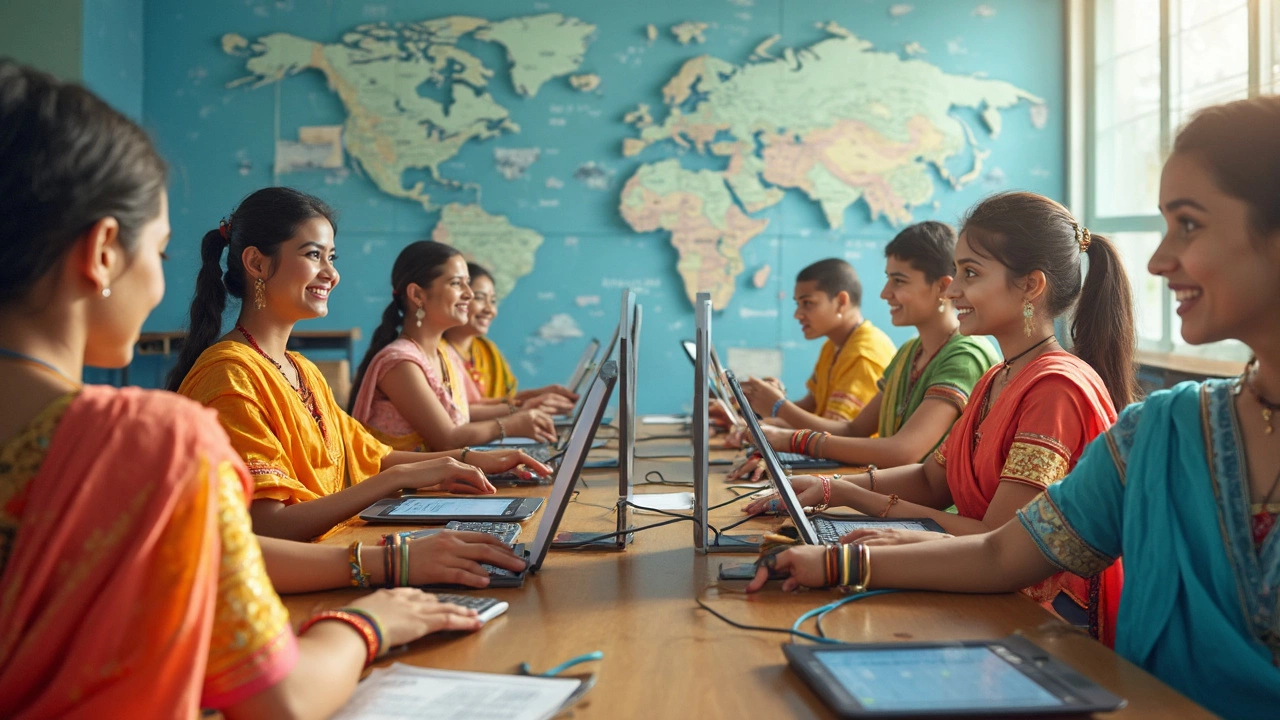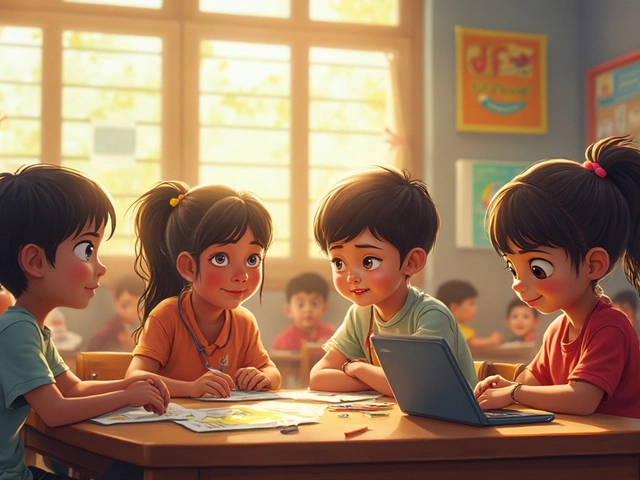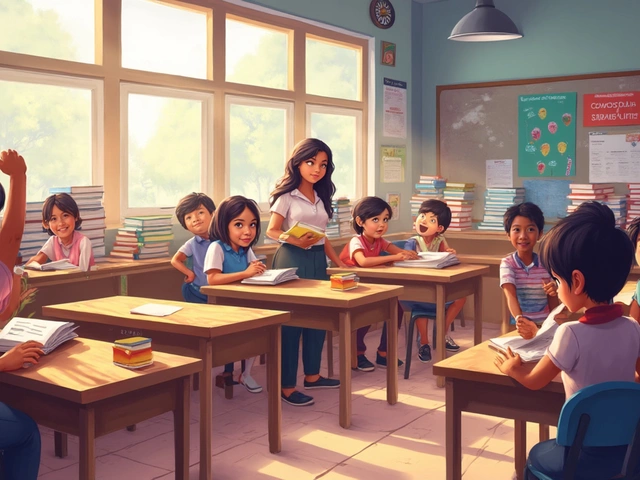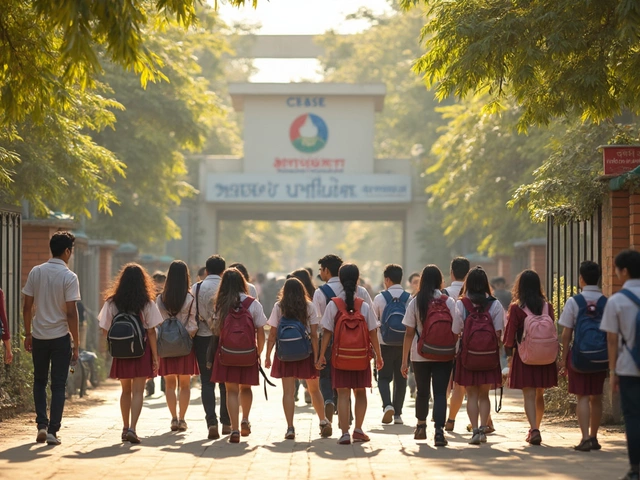Ever wondered if the CBSE, one of India's biggest educational boards, reaches beyond Indian borders? You're not alone. CBSE isn't just another schooling system tied to India; it's got a bit of international flair too. How so? Well, let's start with its core foundation.
While CBSE is deeply rooted in Indian educational traditions, its curriculum and reach have been stepping onto the international stage over the years. Schools all across the world, from the Middle East to Europe, have adopted the CBSE system. Curious how it all works? There’s a bit more to the story than meets the eye.
The syllabus is designed not only to set up students for Indian university entrance exams but also to prep them for a variety of global challenges. By including subjects that foster analytical and critical thinking, CBSE schools focus on creating well-rounded individuals who could take on the world. So, in a way, it's very much like having a passport to a wider academic world.
- Introduction to CBSE
- Indian Roots of CBSE
- International Recognition
- CBSE Curriculum Highlights
- Adapting to Global Standards
- Conclusion
Introduction to CBSE
The Central Board of Secondary Education, or CBSE as most call it, is a giant in the Indian education landscape. Established way back in 1929, it has since become the go-to board for millions of students across the country.
Responsible for setting a high standard of academic excellence, CBSE covers a broad base. From primary school all the way through to the end of high school at grade 12, it's not just about books and exams. CBSE has crafted its syllabus to foster curiosity, creativity, and critical thinking—traits that every global citizen needs.
Why does it matter so much? Its affiliation stretches across 25,000 schools in India itself, and about 240 schools overseas, proving its broad scope. Whether you're in India or abroad, CBSE syllabus is designed to be challenging yet flexible, catering to diverse learning styles and backgrounds.
Interestingly, one of the unique elements of the CBSE curriculum is its emphasis on science and mathematics, but without sidelining arts, humanities, and languages. This gives students the best of both worlds—a rigorous academic foundation paired with a diverse knowledge base.
Plus, it provides a distinct advantage for students aiming for competitive exams like the JEE or NEET in India, giving them a leg up in higher education pursuits.
Indian Roots of CBSE
The Central Board of Secondary Education, or CBSE, is as Indian as it gets when it comes to education. Founded way back in 1929, it's been the backbone of schooling for millions of students across India. The board was established with a mission to provide a robust and balanced education system, emphasizing common educational standards across the country. But what's really intriguing is how CBSE has stayed true to its Indian origins while slowly embracing the global educational landscape.
CBSE's curriculum is framed to reflect India's diverse culture and history. You'll find subjects that delve into traditional Indian arts, history, and languages, making sure students appreciate their roots. Hindi and regional languages are often a staple in the curriculum, allowing students to stay connected to their cultural heritage. The board's approach ensures that despite branching out globally, it never loses sight of where it came from.
Interestingly, CBSE has been a pioneer in adopting a more holistic educational approach within India. Instead of just rote memorization, it encourages practical learning and insight-driven education. The board has introduced Continuous and Comprehensive Evaluation (CCE), which means students are assessed through a variety of projects, assignments, and written exams. This method is all about providing a wholesome education, just like a warm and hearty Indian meal.
CBSE syllabus also promotes Indian values and ethics as a core part of its teaching philosophy. Various events, cultural programs, and activities centered on Indian festivals and traditions are a regular feature in schools. Through these, students learn and imbibe values that are quintessentially Indian, like respect for elders and communal harmony. In the end, CBSE isn't just producing book-smart students; it's nurturing individuals who can contribute to society with a strong moral compass.
International Recognition
You might be surprised to know that the CBSE syllabus isn't just a staple in Indian education. Its reputation has crossed borders, with schools in several countries opting for this curriculum. This includes countries like the United Arab Emirates, Singapore, and even Germany, among others. Why's it gaining traction internationally? Well, for starters, CBSE offers a solid foundation for students eyeing higher education overseas, which makes it appealing to many.
One major reason for its popularity is the syllabus' focus on developing critical thinking and problem-solving skills. The CBSE curriculum encourages students to engage in a broad spectrum of subjects, ensuring they don't just memorize facts but also understand concepts deeply. This approach is pretty much in line with what international universities look for in applicants. That’s a win-win for students all around.
Here's a little interesting nugget of information: Some international schools adopting CBSE provide regional languages as part of their curriculum options. This not only broadens the syllabus but also enriches the cultural exposure for students. So whether you’re in Dubai or New York, a CBSE-affiliated school could offer you the world while keeping you connected to your roots.
What about college admissions? In many countries, particularly the US and Canada, CBSE graduates are recognized for their academic rigor, often standing shoulder to shoulder with other international curricula like the IB or A-Levels. So opting for CBSE could mean keeping both Indian and global higher education doors wide open.

CBSE Curriculum Highlights
So, what's all the buzz about the CBSE syllabus? If you think it's got just the boring ol' textbooks, think again. The curriculum is structured to not only cover the broad spectrum of academic subjects but also to emphasize skill development. Let’s break it down.
First up, the focus on core subjects like Mathematics, Science, and English is pretty intense. These subjects are tailored to help students build a strong foundation that's crucial for any higher studies they might want to pursue. Ever noticed how CBSE exams often focus on understanding and application rather than just rote learning? That's intentional!
Then, there's an impressive lineup of elective subjects ranging from foreign languages to vocational courses like fashion studies or technology. This lets students dig into areas they're genuinely interested in—because we all know how dull it can be to study stuff you couldn't care less about.
What's more? Continuous and Comprehensive Evaluation (CCE) is integrated into the system to ensure students are assessed fairly across different competencies, not just through their ability to mug up facts for a single exam. Doesn't that sound better?
Practical learning gets a thumbs up too, with a curriculum encouraging projects, experiments, and field studies. These hands-on experiences often make the learning stick.
And hey, CBSE is continuously tweaking its curriculum to stay relevant. In 2024, for instance, they introduced Artificial Intelligence as a subject. Smart move, right?
The CBSE international reach means adapting to global educational trends is part of the gig, making sure students are ready for whatever comes next, whether that’s in India or overseas.
Adapting to Global Standards
CBSE isn't just about sticking to Indian ways. Over the years, it has reshaped its curriculum to fit the bill for global educational standards. How does it do this? By constantly updating its syllabus to include more subjects that are relevant worldwide, and through teaching methods that are in sync with international trends.
One of the significant strides CBSE has made is integrating subjects like environmental science and life skills into its core offerings, recognizing the global necessity to address changes beyond the textbook. Students learn in ways that encourage critical thinking and problem-solving, skills that are crucial worldwide.
And let's talk exams. CBSE's exam patterns emphasize not just rote learning but understanding and application of concepts. This is vital because, across continents, the focus is on how well you can use what you know.
Additionally, CBSE schools often use modern tech tools like smart classrooms and e-learning platforms, making tech-savvy students who can take on challenges in any part of the world.
For families shifting between countries, there's comforting consistency, as over 200 schools outside India follow the CBSE syllabus. So kids don’t lose out or deal with too much change when you move. The global reach of CBSE helps maintain educational continuity, an important aspect for many.
Here's the kicker: CBSE has partnered with various international educational bodies to ensure its standards are at par with what's required globally. This means students get access to a quality education that’s recognized far beyond Indian borders. It’s like having a secret membership card that opens international doors!
Conclusion
So, is CBSE truly Indian or International? Well, it's a bit of both. Rooted in Indian tradition, but with branches stretching internationally, the CBSE syllabus bridges the gap between local focus and global reach.
The board's focus on a comprehensive curriculum that encourages both traditional knowledge and contemporary skills makes it versatile and highly valued worldwide. It's no wonder schools across the globe are embracing it. As Dr. Arvind Sinha, a respected educational consultant, puts it,
"CBSE is not bound by geography; it’s designed to create learners anywhere in the world ready for tomorrow's challenges."
Here's a quick look at some interesting stats that show the board's global spread:
| Region | Number of CBSE Schools |
|---|---|
| Middle East | 210 |
| Europe | 50 |
| Asia Pacific | 75 |
With features like continuous assessment and a learning-centric approach, the board prepares students not just for exams but for life’s varied challenges. For anyone thinking about an education that’s both authentically Indian and relevantly global, the CBSE is hard to beat. Whether you're sticking to Indian roots or eyeing a global stage, this curriculum, with its broad reach and deep learning, has got you covered.



